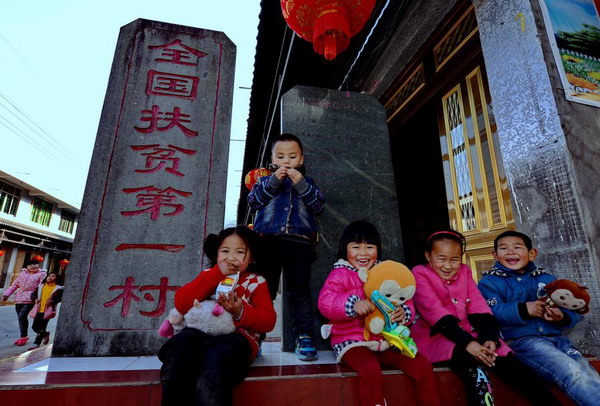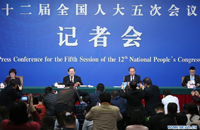UN will help consign poverty to history
 |
|
Children of She ethnic group sit in front of a monument that reads "China's No. 1 Poverty Relief Village" at Chixi Village, Panxi town, Fuding city in East China's Fujian province, Feb 14, 2016. The village has shaken off poverty thanks to assistance from Party and government officials at all levels over the past 30 years. [Photo/Xinhua] |
An ambitious goal of China's 13th Five-Year Plan (2016-20), which entered its second year, is to eliminate extreme poverty by 2020. The progress is well on track, as 10 million people had been lifted out of poverty by the end of 2016. This success is very encouraging as it is an indication of China's continued contribution to global development goals.
The strategy consists of a variety of approaches, including ecological civilization, education, social protection and industrial development, all focusing on rural poverty. The strategy is making at least three important contributions to society.
First, the approaches adopted are highly focused on providing public and social services, which are vital to build up an asset portfolio of the poor, and thus address the root causes of poverty. This means poverty is increasingly being considered as a multi-dimensional problem. The root cause of poverty is not merely a lack of income or necessities for material well-being such as food, housing and land, but also other factors such as access to education, healthcare and inclusiveness in society. All these are essential to address inequalities beyond mere poverty numbers.
Second, the approaches are well in line with the UN's Sustainable Development Goals. If implemented effectively, the strategy will help create jobs, provide more and better public services, and promote sustainable urbanization and natural resources conservation. Doing so means not only lifting millions of people out of poverty, but also helping them stay above the poverty line.
Third, China's poverty reduction experience provides valuable lessons for other developing countries. As the causes of poverty have evolved over time due to changes in socio-economic and environmental conditions, China's poverty-alleviation programs have become more precise. This is manifested in various aspects of China's poverty-alleviation drive, including for instance how the poor are identified, how programs and instruments are designed, and how financial resources are managed and monitored.
However, making poverty reduction inclusive remains a challenge, particularly looking beyond 2020, when other patterns of poverty may emerge in different parts of China. While strategies to address future poverty and inequality trends are yet to be devised, an integrated approach that helps address inter-linked SDGs can be adopted now to reduce inequalities and the causes of unequal access and opportunities for all.
This is where the United Nations system can play a vital role in supporting China. First, the UN can help implement the SDGs at the sub-national level where most of the actions are needed for overall national-level results. This entails integration of sectoral approaches and convening of necessary partners and resources, for which the UN System is well built. It can also bring in various tools to help assess the needs for financing and budget planning-all with an integrated view, which ultimately leads to mainstreaming the SDGs as a key development principle.
Second, the UN can continue offering international perspectives and experiences to China. For example, through the Belt and Road Initiative (the Silk Road Economic Belt and 21st Century Maritime Silk Road), which provides a promising channel to expedite the exchange of knowledge, the UN can help China and other countries to share their experiences in development and trade in services-such as infrastructure, education and healthcare-to promote economic transformation and inclusive growth.
And third, to make the implementation of the targeted poverty-reduction strategy more effective, the UN can help monitor and assess the poverty-alleviation measures. For instance, with more financial resources being allocated for poverty reduction, the UN can help evaluate the cost-effectiveness of public spending by setting up an overarching appraisal system. To prevent people from falling back into poverty and identifying those who have to be lifted out of poverty, real-time and real-place tracking is very important. On this front, the UN can assist China experiment with innovative instruments, such as big data, to monitor poverty dynamics, which complements the traditional household surveys that feed the national database.
China is at the "last mile" of poverty reduction. The UN looks forward to supporting and working with it to consign poverty to history in the near future.
The author is resident coordinator of the United Nations System in China.

























